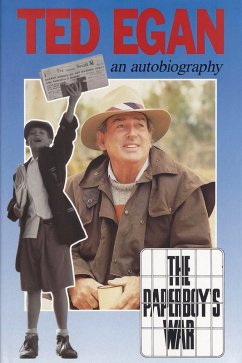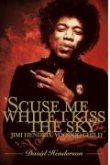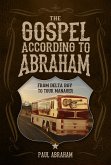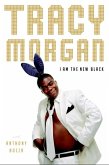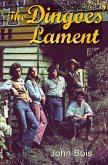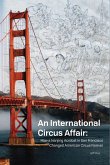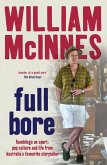'I reckon throwing that rock through the window of Phelan's butcher shop was one of the best things I ever did. But I didn't think so at the time ...'
So begins the Ted Egan story. Old Phelan presented Ted's mother with a bill:
TO WINDOW BROKEN BY TEDDY EGAN
£5 5s 0d.
Ted was going to have to find the money.
He got it as a paperboy, shouting 'Herooda paper!' on street corners. Jumping on and off the No. 20 tram rattling out of the city of Melbourne into Coburg. Ducking back to the newsagency to get a Women's Weekly for a woman in the Ladies' lounge of Brown's Hotel.
In The Paperboy's War the well-known outback folklorist, singer, songwriter, historian, and television presenter recalls his early days, his priestly vocation, the warmth of family life, the agony of puberty, and Melbourne in the 1940s.
A great and terrible war raged, but here we see it from a unique perspective: the paperboy.
At home the Yanks were taking over leafy Parkville, the dance floors and the women's hearts. Even - black Yanks!
Nights at home would be spent tracing the exploits of brave Timoshenko at Stalingrad, speculating on how 'people who live in paper houses' like the Japanese couldn't cause too much trouble, and gaining an encyclopedic knowledge of divisional shoulder patches, enemy aircraft silhouettes and the classes of warships. Ted Egan rekindles the pride Australians felt for 'the Rats' at Tobruk and those who slugged it out on the Kokoda Trail.
But life and dreams go on, war or no war. Every schoolday the excruciatingly beautiful Norma would hop on the tram at The Grove. Br. 'Slick' Edwards at the Christian Brothers would read Man Shy and there arouse a love of words. The return of cousin Frank, the bronzed Anzac from the Middle East, provided a role model. Aunt Mary's tales of the Murchison Goldfields stirred a wish to travel.
And there was cousin Bill, who had run away to sea at 15, travelled the world and experienced the war at close quarters. He came back wearing Italian suits and gave the young Ted an idea. He too would be a sailor. Ted would leave Melbourne and go to Brazil, via Darwin.
Ted Egan was born in Melbourne and spent the first sixteen years of his life there, the years covered by this book, the first of three telling of his life.
He intended to drop in on the Northern Territorians for a month before going off to become a gaucho in South America, but ended up staying in the Territory for more than 40 years.
Ted Egan studied under lamplight in the outback, gaining a BA from ANU. He is working on a post-graduate historical account of the clash between Aboriginal and western culture when a group of Japanese fishermen and a white policeman were speared to death in 1932. He learned two Aboriginal languages and has taught Aboriginal Studies at Alice Springs High School.
He performs, writes, sings and records his own songs, and collects and records others. He is a television presenter and writer.
He is a member of the Prime Minister's Reconciliation Council.
Awarded the Order of Australia (AM) in 1993 for 'services to the Aboriginal community and contribution to the literary heritage of Australia through song and verse', he lives and works in Alice Springs.
So begins the Ted Egan story. Old Phelan presented Ted's mother with a bill:
TO WINDOW BROKEN BY TEDDY EGAN
£5 5s 0d.
Ted was going to have to find the money.
He got it as a paperboy, shouting 'Herooda paper!' on street corners. Jumping on and off the No. 20 tram rattling out of the city of Melbourne into Coburg. Ducking back to the newsagency to get a Women's Weekly for a woman in the Ladies' lounge of Brown's Hotel.
In The Paperboy's War the well-known outback folklorist, singer, songwriter, historian, and television presenter recalls his early days, his priestly vocation, the warmth of family life, the agony of puberty, and Melbourne in the 1940s.
A great and terrible war raged, but here we see it from a unique perspective: the paperboy.
At home the Yanks were taking over leafy Parkville, the dance floors and the women's hearts. Even - black Yanks!
Nights at home would be spent tracing the exploits of brave Timoshenko at Stalingrad, speculating on how 'people who live in paper houses' like the Japanese couldn't cause too much trouble, and gaining an encyclopedic knowledge of divisional shoulder patches, enemy aircraft silhouettes and the classes of warships. Ted Egan rekindles the pride Australians felt for 'the Rats' at Tobruk and those who slugged it out on the Kokoda Trail.
But life and dreams go on, war or no war. Every schoolday the excruciatingly beautiful Norma would hop on the tram at The Grove. Br. 'Slick' Edwards at the Christian Brothers would read Man Shy and there arouse a love of words. The return of cousin Frank, the bronzed Anzac from the Middle East, provided a role model. Aunt Mary's tales of the Murchison Goldfields stirred a wish to travel.
And there was cousin Bill, who had run away to sea at 15, travelled the world and experienced the war at close quarters. He came back wearing Italian suits and gave the young Ted an idea. He too would be a sailor. Ted would leave Melbourne and go to Brazil, via Darwin.
Ted Egan was born in Melbourne and spent the first sixteen years of his life there, the years covered by this book, the first of three telling of his life.
He intended to drop in on the Northern Territorians for a month before going off to become a gaucho in South America, but ended up staying in the Territory for more than 40 years.
Ted Egan studied under lamplight in the outback, gaining a BA from ANU. He is working on a post-graduate historical account of the clash between Aboriginal and western culture when a group of Japanese fishermen and a white policeman were speared to death in 1932. He learned two Aboriginal languages and has taught Aboriginal Studies at Alice Springs High School.
He performs, writes, sings and records his own songs, and collects and records others. He is a television presenter and writer.
He is a member of the Prime Minister's Reconciliation Council.
Awarded the Order of Australia (AM) in 1993 for 'services to the Aboriginal community and contribution to the literary heritage of Australia through song and verse', he lives and works in Alice Springs.
Dieser Download kann aus rechtlichen Gründen nur mit Rechnungsadresse in A, D ausgeliefert werden.

